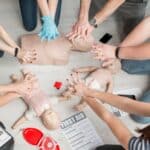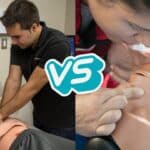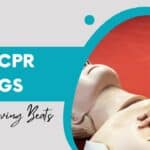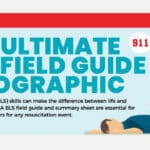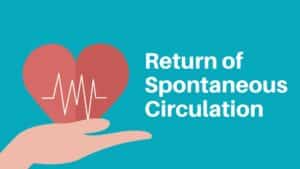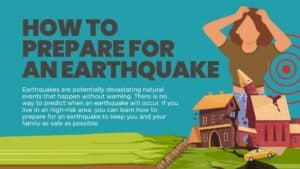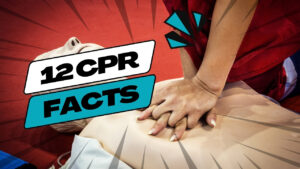For new parents, preparing for a child can be a monumental endeavor. With a checklist of products to buy, people to contact, and skills to learn, certain essentials can easily get lost in the fold. One of those is CPR. This vital life-saving skill is one all parents should know, as it can make all the difference in an emergency. In this guide, we’ve interviewed experts in the childcare and medical industries, each of whom shed experienced insight into the importance of knowing CPR for parents. Get educated below, and get certified with our team here at SureFire CPR.
What is CPR and How Do You Get Certified?
Most parents know what CPR looks like, but many aren’t as clear on what this life-saving technique does. Short for cardiopulmonary resuscitation, CPR is a specialized maneuver that uses chest compressions and (sometimes) artificial ventilation to maintain blood circulation and supply oxygen to the brain in the event of cardiac arrest.
To learn how to administer CPR for adults, children, and infants, you’ll need to take an accredited CPR certification course. There, you’ll learn proper techniques from a trained and certified instructor. You’ll also get detailed info on the ins and outs of CPR best practice, and you’ll get a chance to hone your skills in simulated scenarios. Plus, many courses will also teach you how to use an automatic external defibrillator (AED) and how to respond in the event of a choking emergency. Upon completion of a CPR certification course, you will receive a certification card valid for 2 years.
You Are the First Responder
As if there wasn’t enough pressure as a new parent already — in the event of an emergency, parents are the first ones on the scene. In those crucial moments, their actions that make the most impact. As Andrew Roszak, Executive Director of Communications for the Institute for Childhood Preparedness, puts it:
“The simple fact is that the term ‘first responder’ is really a misnomer. While police, fire, and EMS agencies work hard to respond as quickly as possible, it is really the parents, teachers, child care providers that are the first responders. In situations like choking or cardiac arrest, timely access to care literally makes the difference between life and death.”
Roszak goes on to reveal that the average EMS response time in the United States is about 7 minutes. Permanent brain damage due to lack of oxygen can occur in just 4. With this troubling discrepancy, the necessity for another, faster first-responder should be crystal clear. That first responder is you, the parent.
CPR Situations Are More Common Than You Think
One of the most sobering statistics about cardiac arrest is how common it is. According to the American Heart Association, sudden cardiac arrest deaths in 2015 totaled 366,807 in the United States alone. You never know when you may be called on to perform CPR for your child. Jaymi Torrez, founder of motherhood brand The Salty Mamas, has personally performed CPR several times on children, likely saving their lives each time. She writes:
“I have performed CPR on a child on three separate occasions — twice on my own child and once on my friend’s daughter — and I am absolutely certain that without having attended a CPR training, the outcome would have been horrific each time.”
Torrez’s experience is echoed in that of Kristen King, is a speaker, coach, consultant, and twin mom from Colorado. Consultant for Advocates for Human Potential and founder of the blog AmateurParenting.com, King is passionate about childcare and its intersection with modern medicine. She writes:
“I’ve been CPR trained for 20+ years and I’ve lost track of how many times I have used emergency first-aid skills on children whose parents had no idea what to do in a crisis. … I also provided emergency care to my child when she had what was fortunately her only seizure. Obviously, we can and should call 911 in an emergency, but you cannot wait for first responders to get there to do something. Brain damage can occur within minutes of reduced oxygen.”
Were it not for quick action from Torrez and King, lives may have been lost in each situation above. But cardiac arrest is the only emergency that CPR training can solve. Choking, another emergency that is covered in most CPR courses today, was responsible for 5,501 deaths in the United States in 2017, according to Injury Facts 2017. It’s also incredibly common among young children. As Torrez writes: “You never know how quickly a choking incident can occur (or how quickly you’ll need to respond) until it happens.” Being trained is the only way to ensure that you’ll administer fast, successful aid when the time comes.
Kids Have Conditions, Too
Heart emergencies such as cardiac arrest and heart attacks seem like issues that befall the elderly. But the sad fact is, these emergencies can happen to children, too. According to Dr. Nikola, medical writer for HealthCareers: “There are a lot of conditions that can cause cardiac arrest in kids. Sometimes underlying heart problems can manifest all of a sudden which leaves little time for parents to react.” Dr. Nikola goes on to say that “in some situations, babies’ hearts can stop without any apparent reason, although this is not very common.”
Though not the norm, these heart-related emergencies show a clear and pressing need for parents to know CPR. Dr. Nikola boils it down to the most important step in CPR: chest compressions. “Chest compressions can keep the heart pumping blood until the emergency unit arrives.” Administering CPR in the event of an emergency can buy your baby time. That time can make all the difference between life and death.
Learn More and Get CPR Certified Here at SureFire CPR
Interested in learning more about the importance of knowing CPR for new parents? Ready to get CPR certified? Our team here at SureFire CPR has you covered. Contact us and explore our blog to get more information on CPR and why it’s so important for all adults to know. Once you’ve decided it’s time to get certified, head over to our CPR Certification page to enroll in one of our awarding CPR certification courses in Southern California.
Sources
CPR Facts & Stats. American Heart Association.
Choking Prevention and Rescue Tips. The National Safety Council.


